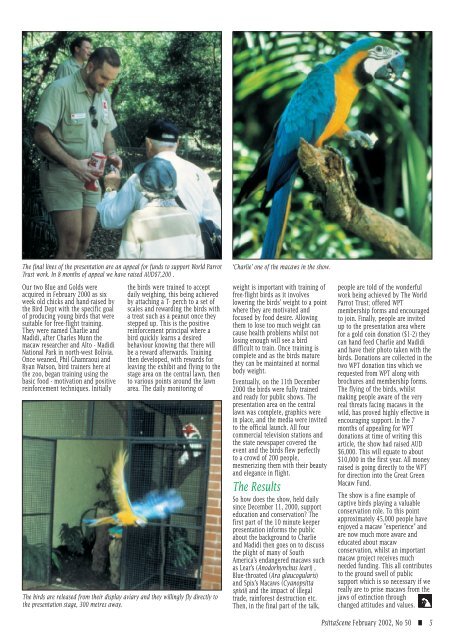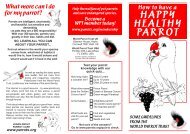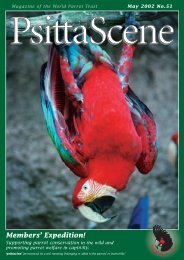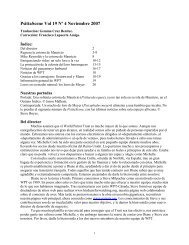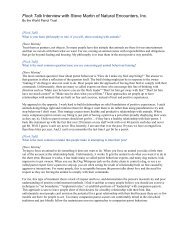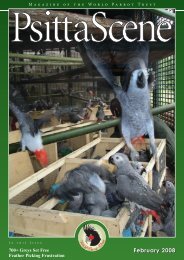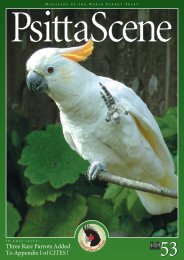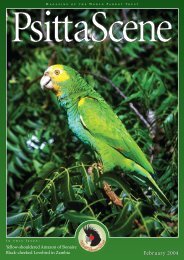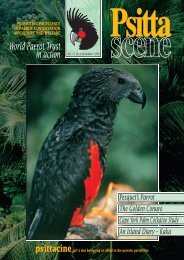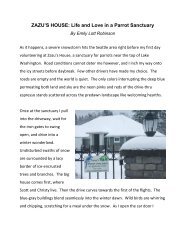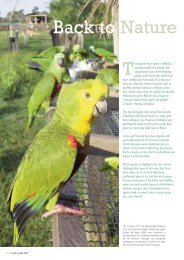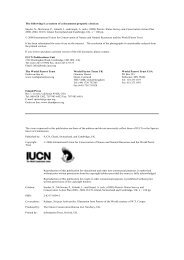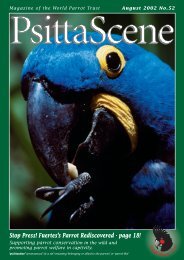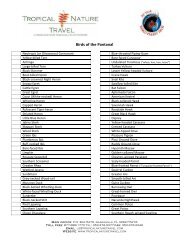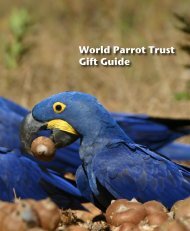Celebrating our 50th Issue! - World Parrot Trust
Celebrating our 50th Issue! - World Parrot Trust
Celebrating our 50th Issue! - World Parrot Trust
Create successful ePaper yourself
Turn your PDF publications into a flip-book with our unique Google optimized e-Paper software.
The final lines of the presentation are an appeal for funds to support <strong>World</strong> <strong>Parrot</strong><br />
<strong>Trust</strong> work. In 8 months of appeal we have raised AUD$7,200 .<br />
Our two Blue and Golds were<br />
acquired in February 2000 as six<br />
week old chicks and hand-raised by<br />
the Bird Dept with the specific goal<br />
of producing young birds that were<br />
suitable for free-flight training.<br />
They were named Charlie and<br />
Madidi, after Charles Munn the<br />
macaw researcher and Alto - Madidi<br />
National Park in north-west Bolivia.<br />
Once weaned, Phil Ghamraoui and<br />
Ryan Watson, bird trainers here at<br />
the zoo, began training using the<br />
basic food - motivation and positive<br />
reinforcement techniques. Initially<br />
the birds were trained to accept<br />
daily weighing, this being achieved<br />
by attaching a T- perch to a set of<br />
scales and rewarding the birds with<br />
a treat such as a peanut once they<br />
stepped up. This is the positive<br />
reinforcement principal where a<br />
bird quickly learns a desired<br />
behavi<strong>our</strong> knowing that there will<br />
be a reward afterwards. Training<br />
then developed, with rewards for<br />
leaving the exhibit and flying to the<br />
stage area on the central lawn, then<br />
to various points around the lawn<br />
area. The daily monitoring of<br />
The birds are released from their display aviary and they willingly fly directly to<br />
the presentation stage, 300 metres away.<br />
‘Charlie’ one of the macaws in the show.<br />
weight is important with training of<br />
free-flight birds as it involves<br />
lowering the birds' weight to a point<br />
where they are motivated and<br />
focused by food desire. Allowing<br />
them to lose too much weight can<br />
cause health problems whilst not<br />
losing enough will see a bird<br />
difficult to train. Once training is<br />
complete and as the birds mature<br />
they can be maintained at normal<br />
body weight.<br />
Eventually, on the 11th December<br />
2000 the birds were fully trained<br />
and ready for public shows. The<br />
presentation area on the central<br />
lawn was complete, graphics were<br />
in place, and the media were invited<br />
to the official launch. All f<strong>our</strong><br />
commercial television stations and<br />
the state newspaper covered the<br />
event and the birds flew perfectly<br />
to a crowd of 200 people,<br />
mesmerizing them with their beauty<br />
and elegance in flight.<br />
The Results<br />
So how does the show, held daily<br />
since December 11, 2000, support<br />
education and conservation? The<br />
first part of the 10 minute keeper<br />
presentation informs the public<br />
about the background to Charlie<br />
and Madidi then goes on to discuss<br />
the plight of many of South<br />
America’s endangered macaws such<br />
as Lear’s (Anodorhynchus leari) ,<br />
Blue-throated (Ara glaucogularis)<br />
and Spix’s Macaws (Cyanopsitta<br />
spixii) and the impact of illegal<br />
trade, rainforest destruction etc.<br />
Then, in the final part of the talk,<br />
people are told of the wonderful<br />
work being achieved by The <strong>World</strong><br />
<strong>Parrot</strong> <strong>Trust</strong>; offered WPT<br />
membership forms and enc<strong>our</strong>aged<br />
to join. Finally, people are invited<br />
up to the presentation area where<br />
for a gold coin donation ($1-2) they<br />
can hand feed Charlie and Madidi<br />
and have their photo taken with the<br />
birds. Donations are collected in the<br />
two WPT donation tins which we<br />
requested from WPT along with<br />
brochures and membership forms.<br />
The flying of the birds, whilst<br />
making people aware of the very<br />
real threats facing macaws in the<br />
wild, has proved highly effective in<br />
enc<strong>our</strong>aging support. In the 7<br />
months of appealing for WPT<br />
donations at time of writing this<br />
article, the show had raised AUD<br />
$6,000. This will equate to about<br />
$10,000 in the first year. All money<br />
raised is going directly to the WPT<br />
for direction into the Great Green<br />
Macaw Fund.<br />
The show is a fine example of<br />
captive birds playing a valuable<br />
conservation role. To this point<br />
approximately 45,000 people have<br />
enjoyed a macaw "experience" and<br />
are now much more aware and<br />
educated about macaw<br />
conservation, whilst an important<br />
macaw project receives much<br />
needed funding. This all contributes<br />
to the ground swell of public<br />
support which is so necessary if we<br />
really are to prise macaws from the<br />
jaws of extinction through<br />
changed attitudes and values.<br />
PsittaScene February 2002, No 50 ■ 5


